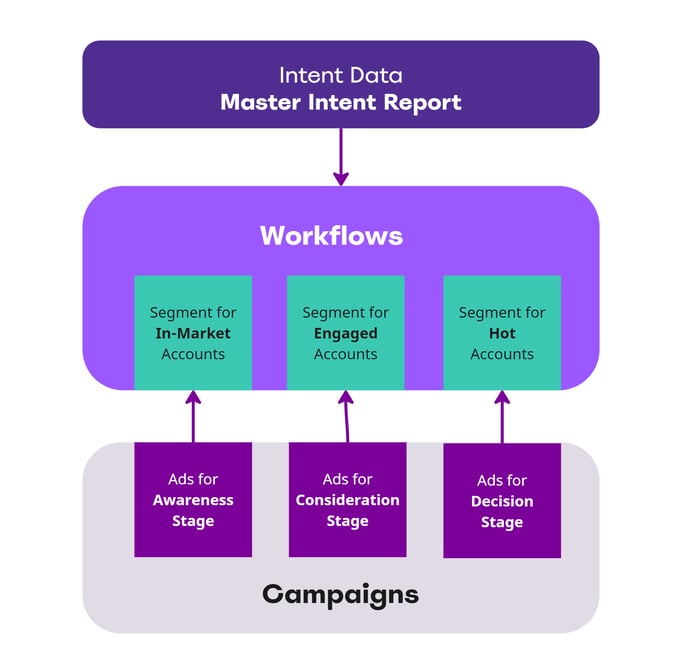Learn how to set up ABM campaigns that nurture accounts through the buying journey (on autopilot)
Why nurture accounts through their buying journey?
95% of your potential customers are not ready to buy at any given time. You might have come across the 95-5 Rule that suggests B2B marketers should focus on long-term brand advertising to build memory and influence future buying decisions. Most buyers are "out-market" and will only enter the market in the future. Therefore, investing heavily in reaching your accounts early in their journey ensures your brand is top-of-mind when these buyers are ready to purchase.
By targeting specific accounts with relevant content and messages based on where they are in their journey, ABM campaigns tend to:
- Have higher conversion rates compared to broader marketing strategies
- Have better ROI
- Result in shorter sales cycles
- Result in stronger relationships, increasing customer loyalty and long-term value
How to run ABM nurture campaigns in N.Rich?
You can easily create and automate the whole setup in the N.Rich ABM platform by leveraging our features to power necessary processes as illustrated below:
|
Process |
Feature |
|
Account Discovery (Using Intent Data) |
Intent Reports |
|
Segmentation & Automation |
Workflows |
|
Account-Based Advertising |
Campaigns |
To orchestrate this in N.Rich you will need:
1. An Intent Report, let's call this your Master Intent Report.
2. Workflows to manage your segments on autopilot
3. Account-Based Advertising Campaigns

Step 1: Account Discovery
To discover accounts showing interest in your business, industry or solution, you can use intent data and our Intent Reports feature. Accounts discovered will be scored with an intent score that can be used to group the accounts based on their intent levels.
To create the intent report, navigate to the Intent Reports feature and Create a master Intent Report using the Net New Demand preset (80/20). You can name the report “Master Intent Report”.
Step 2: Segmentation & Automation
Once you have created the intent report, the next step would be to group your accounts in segments based on their interest level (using intent scores). Our recommended setup is to create the 3 segments described below:
|
Score |
Stage |
Segment |
|
0 to 30 |
Awareness Stage |
In-Market Account Segment |
|
30 to 60 |
Consideration Stage |
Engaged Account Segment |
|
60 to 100 |
Decision Stage |
Hot Account Segment |
To populate the segments based on the intent scores, you should create Workflows. Workflows will populate segments and keep them in sync automatically, automating the whole setup. The instructions below will help you create the Workflows and associated segments:
Create the Workflows based on the table below. When selecting the segment destination within a Workflows setup, opt to create a new segment and name it accordingly.
|
Score Trigger |
Action |
Destination |
|
Less than 30 |
SYNC |
In-Market Segment |
|
Between 30 & 60 |
SYNC |
Engaged Segment |
|
Greater than 60 |
SYNC |
Hot Segment |
The completed setup should look like the screenshot below:
Step 3: Account-Based Advertising
Now that you have your segments, you can create your ABM program with 3 campaigns targeting buyers in each stage. Our recommendation is to tailor the ads in your campaigns to the stages.
|
Stage |
Segment |
Content to promote |
|
Awareness |
In-Market Segment |
Branded Videos |
|
Consideration |
Engaged Segment |
Solution Overviews |
|
Decision |
Hot Segment |
Trials/Demos |
.png?height=120&name=Primary%20Logo_3%20(1).png)